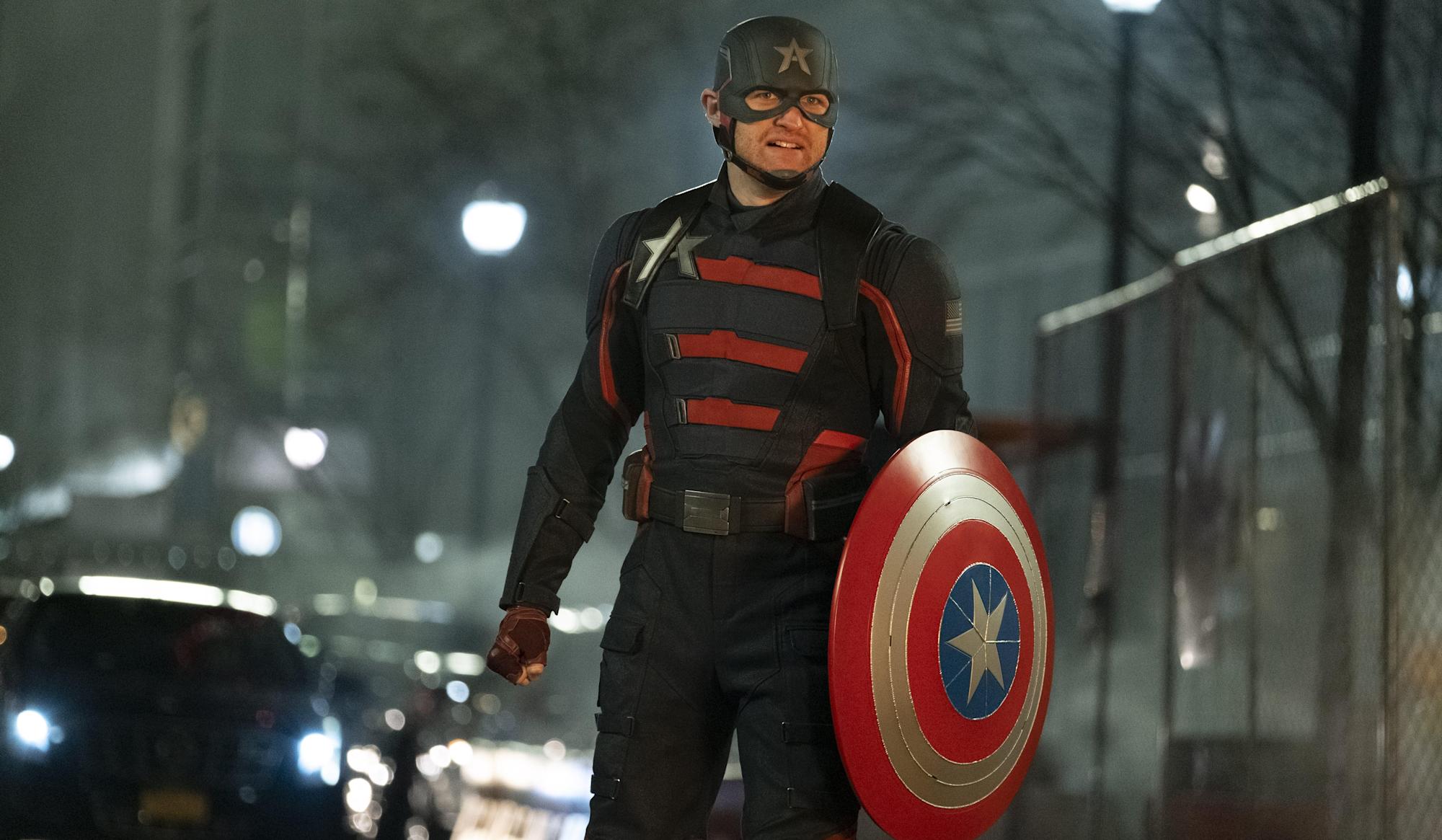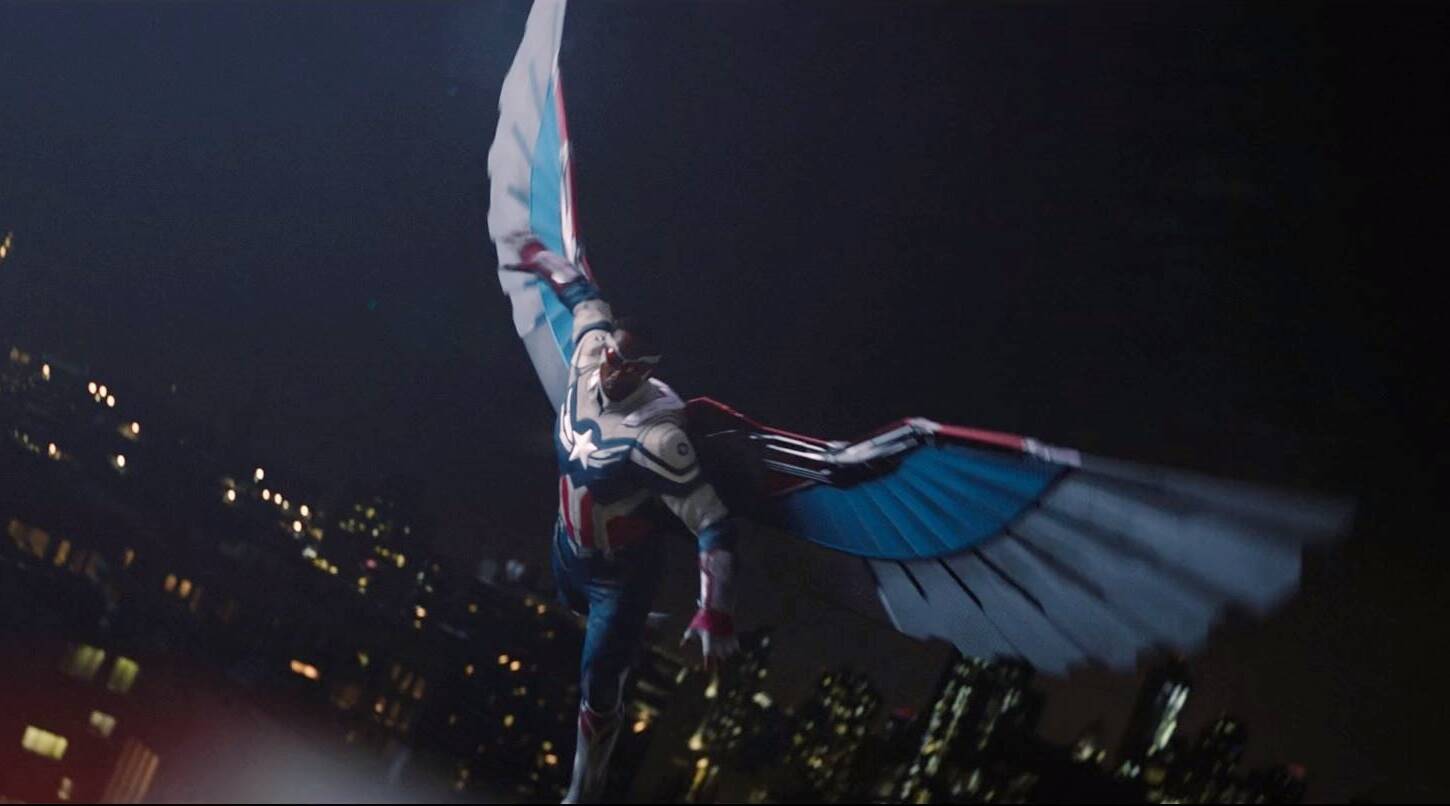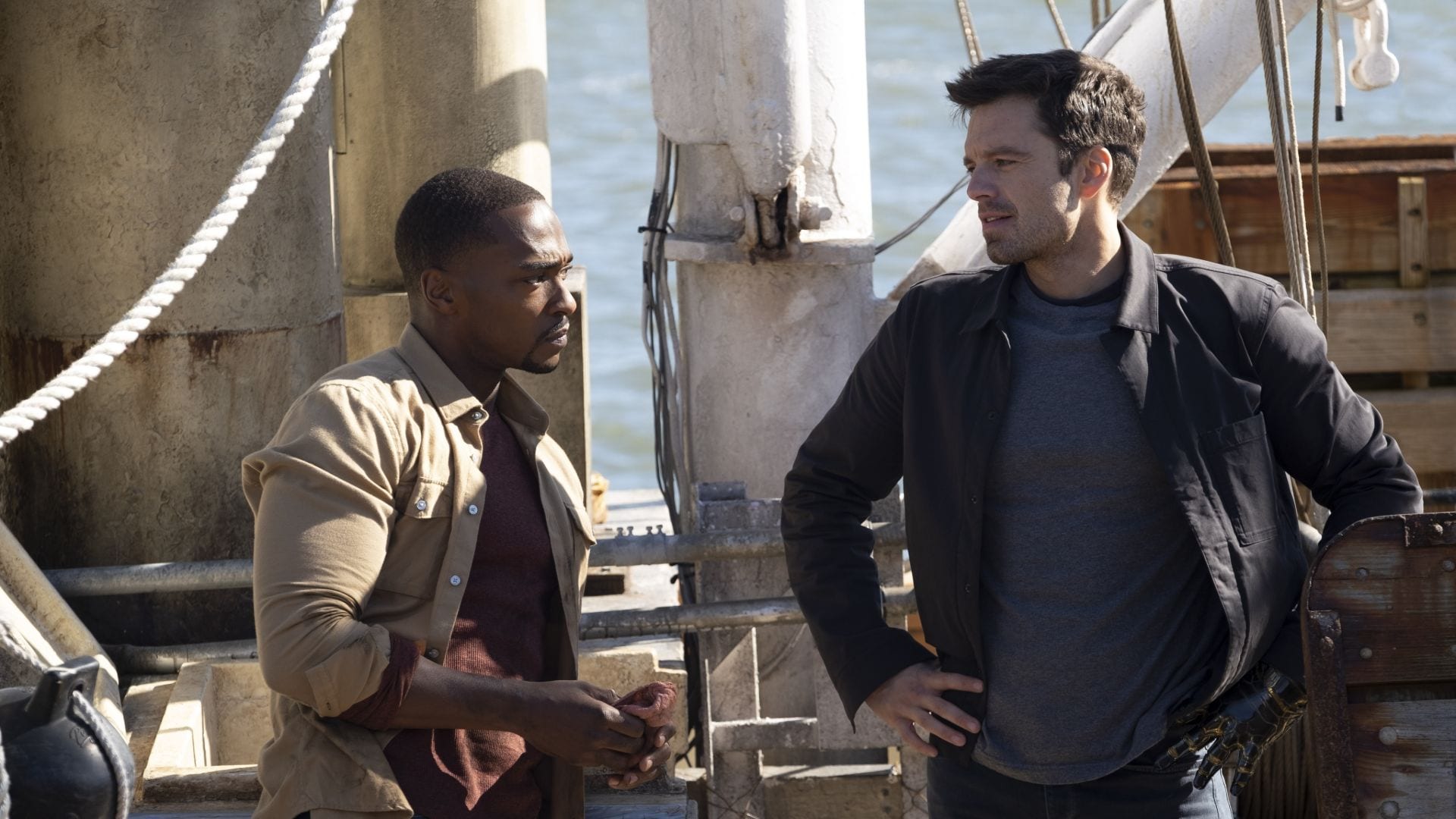REVIEW: The Falcon and the Winter Soldier – Episode 6 “One World, One People”
"I thought Captain America was on the moon."
“One World, One People” is, if nothing else, the blissful end to this tedious chore of a series. It’s as obnoxiously preachy as you’d expect after last week, but it’s worse because it revels in its effectively admitted ignorance. Parts of it are good, though, and those parts frustrate because they’re set in opposition to morally repugnant ideas.
The Flag Smashers attack the Global Repatriation Council meeting while Sam, Bucky, and John Walker try to stop them. That’s pretty much it; this is the season finale, so it’s action climax time.
“One World, One People” gets right to the point as Karli and her terrorist group begin their siege of the GRC to realize their vision of a world without borders. Somehow, this ragtag band of 20-somethings has managed to infiltrate a government body and use its insiders to throw smoke grenades into what one would imagine is a heavily guarded meeting. This whole setup makes no sense; the Flag Smasher spies are even walking around with their masks on, making no effort to be covert. I understand that superhero stories aren’t supposed to be grounded in reality all the time, but this is ridiculous. So the GRC members are ushered away by the security guards who are supposed to protect them but let a group of masked criminals attack them, and Karli pontificates about how killing hundreds of people is a small price to pay to make sure sovereign nations aren’t allowed to have borders. But have no fear, because the heroes are on the way… well, depending on which side you’re on, have no fear.
*SPOILERS*
Not long into the attack, Sam shows up in his full All New, All Different Captain America getup from the comics and wielding Steve’s shield. “One World, One People” hits you over the head with the idea that Sam is Captain America now, and you better keep any opinions you have on the subject to yourself. I don’t think Steve Rogers was referred to as “Captain America” over the course of seven movies as often as Sam is in this one episode. I’ve written about my dislike for legacy heroes before, so I’ll try to focus on the execution. As with the rest of the series, it’s a very mixed bag. Sam demonstrates heroism, particularly in rescuing those in danger, and that’s all great; you build a hero through his heart and his actions, not admonishments on racism. But Sam also does some stupid and ugly things, the worst of which is, once again, sympathizing with Karli, an unrepentant murderer who resolutely assures everyone in earshot that she’ll kill again, and many more people if need be, to get what she wants. And Sam is still trying to coddle her, even letting her – and keep in mind, Karli has the super soldier serum in her veins, and Sam doesn’t – beat on him without putting up a fight. And when someone else does what Sam refuses to, he walks out with her cradled in his arms like a loved one he couldn’t save and lectures her intended victims on why she was right and calling her a terrorist is wrong. Marvel begins the career of its spiffy new Captain America by having him tell us that terrorists are noble and nations having borders is evil. Of course, there’s the mealy-mouthed ass-covering of “Well, her methods may have been a little silly,” but it’s clear whose side Sam is on, and it’s not the innocent people this psycho killed.
This scene, where Sam gives the GRC members a stern talking to about how the crazies who almost vaporized them are the good guys, is a perfect example of why it’s difficult to mix superhero stories and politics. Everything Sam says to these people is completely divorced from reality. He talks about how they don’t know what it’s like to be displaced, and he gives them an endless litany of emotional pleas to put a little love in their hearts. What he doesn’t do is offer a single practical solution. Everything he says is about making them feel too guilty to challenge him, checking their privilege for the world to see. And when one of the council members says something entirely rational, Sam just talks around it. This isn’t only bad for the storytelling and the themes “One World, One People” desperately wants to make sure everyone understands; it’s bad for Sam as a character. This is supposed to be his big hero moment, but he sounds like an idiot who has no idea what he’s talking about, a kid at the adult’s table. Remember how, in Civil War, almost every character made reasoned, thoughtful arguments for and against the Sokovia Accords, and how the underlying issue of individual rights vs. government control was handled with nuance and complexity, and how even the answer to that debate was fairly subtle in the end? Well, the MCU has gone from that to “Don’t hurt anybody’s feelings” in the space of this season of television.

In the action department, “One World, One People” is somewhat better. It’s through the big battle that a better theme emerges, and one that Sam, Bucky, and Walker all embody: being a hero on your own terms, not on those dictated to you by the government. This is something that’s been a part of the MCU from the beginning, and I’m happy any time I see it emerge. Sam doesn’t wait for some bureaucrat somewhere to tell him it’s okay to help people; he just does it because it’s the right thing to do. Similarly, John Walker jumps into the fray after being fired by the brass, and it’s here that he becomes more than just a blunt instrument to be pointed at whoever the suits don’t like this week. Under fire, Walker chooses to forgo his revenge to save lives. It’s only when free of the state’s oversight that he’s able to find the hero within himself. Walker has been wildly inconsistent, and it’s hard to understand how the series views his actions or his arc, but I like where he’s left, even if the road to get there was rockier than a crumbling mountain. Bucky does the same, but he was already on this page, so it isn’t as important as it is to Sam and Walker. The problem with the action is that much of it is poorly filmed and shot so dark it’s hard to see. I have no idea what went on with Sam and that helicopter until the final moments when he saves people on the bridge. When most of the rest of the show fails, more attention should have gone to the fun stuff.
The rest of “One World, One People” is a snooze. Bucky is relegated to a supporting character, his only standout moment being when he repeats the ending of The Bourne Supremacy. But he isn’t much missed because he doesn’t work well as a main character; Sam doesn’t either, but I guess they had to pick one of the two guys in the title to be the focus. Sharon Carter was the Power Broker all along, and it’s hard to feel two ways about it; it makes some sense, as she serves no other purpose in the story, but the character and performance are so weightless that it amounts to dead air. She also makes one of the dumbest decisions anyone on film ever has, shooting a guy trying to save her and allowing the armed woman who wants to kill her to get the upper hand. This is the criminal genius who runs Madripoor? And it looks like she’ll be back, which means we’ve gone from villains like Loki, Thanos, and the Red Skull to Peggy Carter’s niece and a college campus activist on steroids. Look out, heroes, here they come! Julia Louis Dreyfus’ one scene is as embarrassing as her introduction, and I feel bad for her having to mug her way through what could have been a fun role. Zemo having the remaining Flag Smashers killed means that we’ll never have to deal with these losers again and further proves that he’s the true hero of the show. One thing I liked a lot, though, was Sam having a statue made for Isaiah Bradley; this is one of the few scenes with real emotional power, as a man who bled for his country only to be stabbed in the back by its corrupt government is recognized as the hero he always was. Sometimes, it’s the small gestures that mean the most to us.

“One World, One People” is the likeliest of endings for The Falcon and the Winter Soldier. It’s relentlessly preachy, its big moral stance is despicable, and its attempts to comment on politics are embarrassingly stupid. But it has a few decent scenes, and its view on what makes a hero is a good one, and in the Marvel tradition. Now, bring on Loki, and for the love of God, please let us have fun again.
The Falcon and the Winter Soldier – "One World, One People"
Plot - 5
Acting - 6
Progression - 7
Production Design - 7
Themes - 4
5.8
Lacking
“One World, One People” is the likeliest of endings for The Falcon and the Winter Soldier. It’s relentlessly preachy, its big moral stance is despicable, and its attempts to comment on politics are embarrassingly stupid. But it has a few decent scenes, and its view on what makes a hero is a good one, and in the Marvel tradition.
Comments (4)
Thanks very much!
I’d be up for an Isaiah Bradley show, if only to see more of Carl Lumbly.

I thought it was great, but although not a Strong show…although I’m not going to argue with your opinions. You have your say, and I have mine. I’m not upset with your opinions about the show.
Different strokes for different folks, friend. Thanks very much for reading.








I really think you hit the nail on the head with this review. Isiah Bradley’s character was the embodiment of the affects of racism. Continuing to explore that through Isiah’s eyes would have been more effective than Sam’s monologue to the GRC (which came across as quite “preachy”.) Also, his interaction with Karli made absolutely ZERO sense. He was going to let her shoot him in the head for what? To prove a point? Because she’s a “kid”? Unfortunately, I think Marvel may have missed the target on this finale.
P.S. Would LOVE to see a live-action Isiah Bradley mini-series.